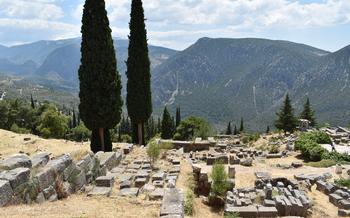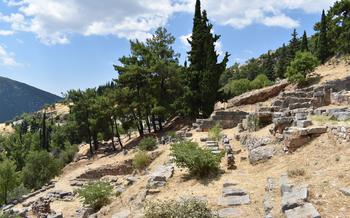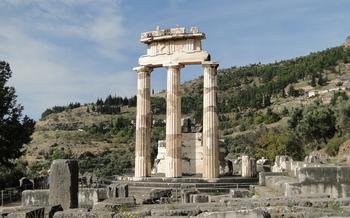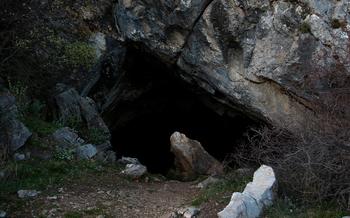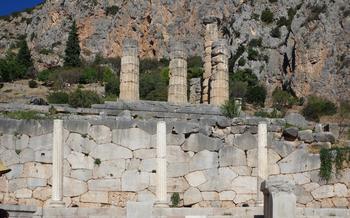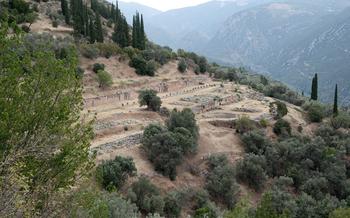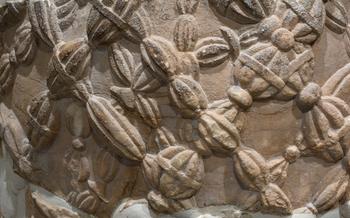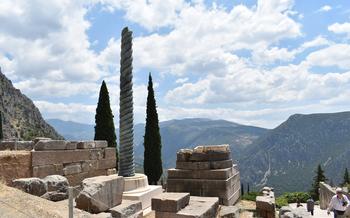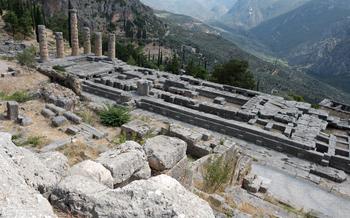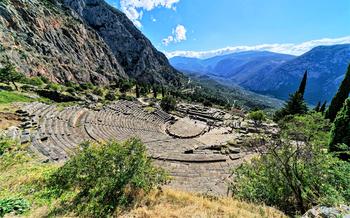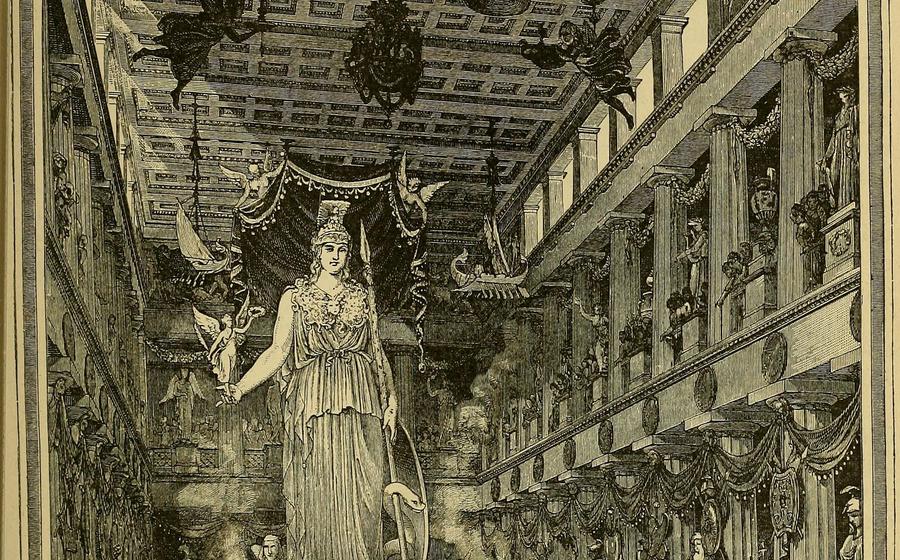
The Valley of the Muses
- Historical Significance
- Delphi Archaeological Site
- Temple of Apollo
- Oracle of Delphi
- Delphi Museum
- Castalian Spring: A Sacred Source of Inspiration
- Sanctuary of Athena Pronaia
- Polygonal Wall
- Delphi Festival: A Revival of Ancient Traditions
- Hiking Trails
- Gastronomy
- Accommodation
- Transportation
- Insider Tip
Historical Significance
Delphi, nestled amidst the majestic peaks of Mount Parnassus, holds a profound significance in the annals of Greek history and culture. This ancient city served as a pivotal religious and political center, drawing pilgrims and statesmen from across the Hellenic world. The oracle of Delphi, renowned for its enigmatic prophecies, played a crucial role in shaping the course of Greek history. Myths and legends intertwined with reality, weaving a tapestry of spirituality and intrigue that captivated the ancient Greek imagination. Delphi stood as a beacon of wisdom, guidance, and cultural enlightenment, leaving an indelible mark on the development of Greek civilization.
Delphi Archaeological Site
The Delphi Archaeological Site, a UNESCO World Heritage Site, offers a glimpse into the grandeur of ancient Greece. Walk along the Sacred Way, the main thoroughfare leading to the Temple of Apollo, lined with treasuries and monuments dedicated to various city-states. Ascend the steps to the temple, an awe-inspiring Doric structure that once housed the Oracle of Delphi. Explore the ruins of the Athenian Treasury, with its intricately carved frieze depicting the battle between Greeks and Amazons. Discover the remains of the Tholos, a circular building with a conical roof, and the Gymnasium, where athletes trained for the Pythian Games. The site also features the Castalian Spring, where visitors can sip from the sacred waters that inspired ancient poets and philosophers.
Delphi's excavation history is as fascinating as the site itself. French archaeologists began excavating in the late 19th century, unearthing a treasure trove of artifacts, sculptures, and inscriptions. Among the most significant discoveries were the Charioteer of Delphi, a life-size bronze statue of a victorious charioteer, and the Sphinx of Naxos, a majestic marble statue with a haunting smile. Ongoing restoration efforts aim to preserve and protect the site's fragile remains, ensuring that future generations can continue to marvel at the wonders of Delphi.
Temple of Apollo
The Temple of Apollo stands as a testament to ancient Greek architectural prowess and religious devotion. Its construction, spanning the 6th century BC, reflects the significance of Delphi as a religious center. The temple's Doric columns, a hallmark of Greek architecture, exude strength and harmony, creating a sense of awe and grandeur.
Inside the temple, the atmosphere was one of reverence and mystery. It was here that the oracle, known as the Pythia, delivered her cryptic prophecies, influencing decisions and shaping the course of history. The temple's interior was adorned with sculptures and artifacts, including the renowned Charioteer of Delphi, a bronze masterpiece that captures the essence of ancient Greek craftsmanship.
The Temple of Apollo remains a symbol of Delphi's religious significance and a testament to the enduring power of ancient Greek beliefs. Its presence transports visitors back in time, allowing them to glimpse into the world of oracles, prophecies, and the divine.
Oracle of Delphi
The Oracle of Delphi was a renowned religious institution in ancient Greece, where people sought advice and prophecies from the oracle, believed to be the voice of the god Apollo. The process of seeking advice involved a series of rituals and ceremonies. Individuals would first purify themselves by bathing in the sacred Castalian Spring and offering sacrifices to Apollo.
Once purified, they would enter the temple and approach the Pythia, the oracle priestess. The Pythia would then enter a trance-like state, believed to be induced by divine inspiration. While in this state, she would utter cryptic and ambiguous prophecies, which were interpreted by the priests of Apollo and delivered to the seekers.
The Oracle of Delphi gained immense influence and reputation throughout the ancient world. Kings, statesmen, and ordinary citizens alike consulted the oracle for guidance on important decisions, ranging from political strategies to personal matters. Its prophecies were believed to hold great sway, and many significant events in Greek history are said to have been influenced by the oracle's pronouncements.
However, the Oracle of Delphi was not without its skeptics. Some philosophers and historians questioned the validity of the prophecies, suggesting that they were influenced by political or personal agendas. Despite these debates, the oracle remained a powerful and influential institution for centuries, playing a significant role in shaping the religious and cultural landscape of ancient Greece.
Delphi Museum
The Delphi Museum, situated at the foot of the archaeological site, houses a treasure trove of artifacts and relics unearthed from the ancient city. Its collection is a testament to the rich cultural and religious significance of Delphi. Among the most notable exhibits are the Sphinx of Naxos, a majestic marble sculpture dating back to the 6th century BC, and the bronze statues of athletes, capturing the essence of ancient Greek athleticism. The museum also displays an array of inscriptions, pottery, and sculptures, providing insights into the daily lives, religious practices, and artistic achievements of the ancient Delphians. With its interactive exhibits and educational programs, the Delphi Museum offers a comprehensive journey through the history and legacy of this sacred site.
Castalian Spring: A Sacred Source of Inspiration
At the foot of the Phaedriades rocks, a sacred spring gushes forth, revered by the ancient Greeks as the Castalian Spring. This natural wonder was considered a source of inspiration and purification, closely associated with the Muses, the divine patrons of the arts and sciences. According to mythology, the Muses bathed in the spring's crystal-clear waters, bestowing their gifts upon those who drank from it.
In ancient times, pilgrims and seekers of knowledge flocked to the Castalian Spring to partake in purification rituals before consulting the Oracle of Delphi. They believed that the spring's waters possessed the power to cleanse the mind and soul, preparing them for the profound experience of seeking divine guidance.
The spring's allure extended beyond its religious significance. Poets, musicians, and artists sought inspiration within its serene surroundings. They believed that drinking from the Castalian Spring would enhance their creative abilities and connect them to the divine realm. Even today, visitors can experience the magic of the Castalian Spring, immersing themselves in its history and allowing their imaginations to soar.
Sanctuary of Athena Pronaia
Situated amidst the picturesque landscapes of Delphi, the Sanctuary of Athena Pronaia stands as a testament to the ancient Greeks' devotion to their deities. Dedicated to the goddess Athena, revered as the protector of the city, this sacred site holds a significant place in Greek mythology and history.
The sanctuary's origins date back to the Mycenaean period, with the earliest structures erected in the 14th century BC. Over time, it underwent several expansions and modifications, reflecting the evolving religious practices and beliefs of the ancient Greeks. The sanctuary reached its peak during the 6th and 5th centuries BC, coinciding with Delphi's rise as a prominent religious and political center.
The most striking feature of the sanctuary is the Tholos of Delphi, a circular temple constructed in the 4th century BC. Its unique design, characterized by a colonnade of 20 Doric columns surrounding a central cella, sets it apart from other ancient Greek temples. The Tholos served as a place of worship for Athena Pronaia and was adorned with exquisite sculptures and reliefs, showcasing the artistic prowess of the ancient Greeks.
Within the sanctuary, visitors can also admire the well-preserved remains of other significant structures, including the Temple of Athena Pronaia, dating back to the 6th century BC, and the Stoa of the Athenians, built in the 5th century BC. These structures housed numerous votive offerings and dedications made by pilgrims and worshippers seeking the goddess's favor and protection.
The Sanctuary of Athena Pronaia offers a glimpse into the religious beliefs and practices of the ancient Greeks, highlighting the importance of Athena in their pantheon. Its well-preserved ruins, coupled with the stunning natural surroundings, make it a must-visit destination for anyone interested in ancient history, mythology, and architecture.
Polygonal Wall
Amidst the ruins of ancient Delphi, the Polygonal Wall stands as a testament to the ingenuity and defensive prowess of the ancient Greeks. Constructed in the 4th century BC, this remarkable structure served as a protective barrier safeguarding the city from potential invaders. Its name derives from the unique shape of its blocks, which were cut and arranged in a polygonal pattern, creating a formidable and impenetrable barrier.
The polygonal blocks, each carefully fitted together without the use of mortar, showcased the exceptional craftsmanship of the ancient builders. The wall's thickness, varying from 3 to 5 meters, and its height, reaching up to 5 meters, further enhanced its defensive capabilities. The intricate interlocking of the blocks not only provided stability but also allowed for flexibility, enabling the wall to withstand earthquakes and other seismic disturbances that frequently shook the region.
Archaeological excavations have revealed that the Polygonal Wall extended for approximately 5 kilometers, encircling the ancient city. Along its course, towers and gates were strategically positioned, providing additional security and allowing for controlled access to Delphi. The wall's construction not only served a practical purpose but also demonstrated the city's wealth and power. Its imposing presence symbolized Delphi's significance as a religious and political center in the ancient world.
Today, the Polygonal Wall stands as a silent witness to the grandeur and resilience of ancient Delphi. Its well-preserved sections, scattered amidst the archaeological site, offer a glimpse into the city's remarkable fortifications and provide a tangible connection to its rich history. Visitors can marvel at the intricate construction techniques and imagine the formidable presence this wall once held, protecting the sacred oracle and the treasures it contained.
Delphi Festival: A Revival of Ancient Traditions
The Delphi Festival, a vibrant cultural event, breathes new life into the ancient traditions of Greece. This festival, revived in 1927, pays homage to the rich heritage of Delphi and its significance as a center of art, music, and drama. Throughout the summer months, the festival transforms the archaeological site into a stage, hosting a diverse array of performances, workshops, and exhibitions.
Visitors can immerse themselves in ancient Greek culture by attending theatrical productions that bring to life the works of renowned playwrights like Sophocles and Euripides. These performances, held in the evocative setting of the ancient theater, transport audiences back in time, allowing them to experience the power and majesty of classical drama.
Beyond theater, the festival showcases traditional Greek music concerts, featuring talented musicians playing melodies that have echoed through the centuries. Workshops and demonstrations provide hands-on experiences, allowing participants to learn about ancient crafts, dances, and rituals. Art exhibitions showcase the works of contemporary Greek artists, drawing inspiration from the rich history and mythology of Delphi.
The Delphi Festival is not just a cultural extravaganza; it is a testament to the enduring legacy of ancient Greece. By celebrating the traditions and values that shaped Western civilization, the festival fosters a connection to the past while promoting cultural heritage and fostering a sense of pride among Greeks and visitors alike.
Hiking Trails
Delphi's stunning natural surroundings offer a variety of hiking trails for outdoor enthusiasts. The trails range in difficulty from easy to challenging, catering to hikers of all levels. The most popular trail leads to the Corycian Cave, a sacred site associated with the god Pan. The trail winds through picturesque landscapes, offering breathtaking views of the valley and the surrounding mountains.
Another popular trail takes hikers to the top of Mount Parnassus, the highest peak in the region. The challenging ascent rewards hikers with panoramic views of the surrounding countryside, including the Gulf of Corinth and the distant Peloponnese peninsula. For those seeking a more leisurely experience, there are several shorter trails that meander through olive groves and pine forests, offering a tranquil escape into nature.
Along the trails, hikers can encounter various historical sites, such as ancient ruins, Byzantine churches, and traditional villages. The trails also provide opportunities for wildlife spotting, as the area is home to a diverse range of birds, reptiles, and mammals. Whether you're an experienced hiker or simply looking for a scenic stroll, Delphi's hiking trails offer a unique and rewarding way to explore the region's natural beauty and cultural heritage.
Gastronomy
Delphi's gastronomy is a delightful blend of traditional Greek flavors and local delicacies. Indulge in mouthwatering dishes prepared with fresh, seasonal ingredients, showcasing the region's culinary heritage. Savor the tangy feta cheese, produced locally from sheep's or goat's milk, and enjoy the simplicity of a traditional Greek salad, bursting with crisp cucumbers, juicy tomatoes, and Kalamata olives.
For a taste of the sea, try the grilled octopus, expertly charred and seasoned to perfection, or savor the succulent seafood platter, featuring an array of freshly caught treasures from the nearby waters. Meat lovers will delight in the slow-cooked lamb or goat dishes, infused with aromatic herbs and spices, and paired with grilled vegetables or creamy mashed potatoes.
Don't miss the opportunity to sample the local wines, produced in the vineyards of the surrounding region. From crisp whites to robust reds, there's a wine to complement every meal. And for a sweet treat, indulge in traditional pastries like baklava, kataifi, and loukoumades, drizzled with honey or sprinkled with cinnamon.
To fully immerse yourself in the local culinary experience, visit one of the traditional tavernas in Delphi, where you can enjoy authentic Greek dishes prepared with love and care. Savor the ambiance of these cozy establishments, often family-run, and engage with the friendly locals who are passionate about sharing their culinary traditions.
Accommodation
Delphi offers a diverse range of accommodation options, catering to travelers with different budgets and preferences. From budget-friendly hostels and guesthouses to comfortable hotels and luxurious resorts, there's something for everyone in this historic town.
For budget-conscious travelers, there are several hostels and guesthouses that offer basic but clean and comfortable accommodations. These options are often located within walking distance of the archaeological site and other attractions, making it easy to explore Delphi on foot. Some popular budget-friendly options include the Delphi Camping, the Delphi Town House, and the Delphi Hostel.
Mid-range hotels offer a good balance of comfort and affordability. These hotels typically provide private rooms with en-suite bathrooms, as well as amenities such as air conditioning, Wi-Fi, and breakfast. Some recommended mid-range hotels in Delphi include the Hotel Leto, the Amalia Hotel Delphi, and the Fedriades Delphi Hotel.
For those seeking a luxurious stay, Delphi has several high-end hotels that offer upscale accommodations and amenities. These hotels often feature spacious rooms with balconies or terraces overlooking the archaeological site or the surrounding mountains. Some top-rated luxury hotels in Delphi include the Grand Hotel Delphi, the Delphi Palace Hotel, and the King's Hotel Delphi.
When planning your trip to Delphi, it's essential to book your accommodation in advance, especially during the peak tourist season (April-October). This will ensure that you have a place to stay upon arrival and avoid any last-minute surprises.
Transportation
Reaching Delphi is a breeze, with multiple transportation options available. From bustling Athens, you can hop on a comfortable bus or train, enjoying the scenic countryside en route. The journey takes approximately three to four hours, offering ample time to unwind and soak in the anticipation of exploring this ancient marvel.
If you prefer a more flexible itinerary, renting a car is a great option. Embark on a road trip, savoring the freedom to stop at charming villages and historical sites along the way. The drive from Athens takes about two and a half hours, allowing you to set your own pace and embrace the spontaneity of discovery.
Once in Delphi, you'll find that most attractions are within walking distance, inviting you to immerse yourself in the town's rich history and vibrant atmosphere. However, if you wish to venture beyond the archaeological site, taxis and rental cars are readily available, providing convenient transportation to nearby villages, scenic viewpoints, and hidden gems waiting to be unearthed.
Insider Tip
-
European Cultural Centre of Delphi: Immerse yourself in art and culture at the European Cultural Centre of Delphi, which hosts captivating art exhibitions, concerts, and cultural events throughout the year. Don't miss the chance to engage with contemporary artistic expressions inspired by ancient Greek heritage.
-
Village of Arachova: Discover the charm of the nearby village of Arachova, nestled amidst picturesque mountains. Stroll through its cobblestone streets, admire traditional stone houses, and soak in the breathtaking views of the surrounding landscape. In winter, Arachova transforms into a popular destination for skiing and other winter sports.
-
Hosios Loukas Monastery: Embark on a short journey to the Hosios Loukas Monastery, a UNESCO World Heritage Site. Marvel at its exquisite Byzantine architecture, intricate mosaics, and well-preserved frescoes. Immerse yourself in the tranquility of this sacred site and learn about its rich history and religious significance.
